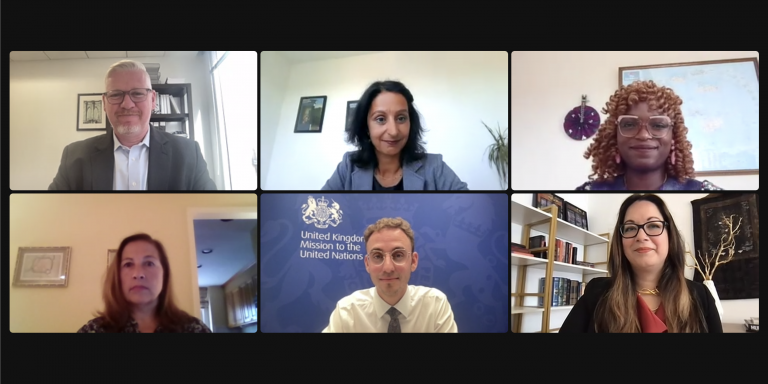On June 21, 2023, The Soufan Center hosted a webinar discussing mechanisms available to hold terrorist actors accountable for sexual and gender-based violence. This event was hosted in partnership with the United Kingdom Mission to the United Nations and the discussion focused on international efforts to deliver justice for both survivors and perpetrators, map the state of prosecutions for terrorist crimes at the intersection of human trafficking and sexual violence in conflict, and offered recommendations for policymakers and practitioners, including in the United Nations regarding terrorist use of SGBV.
An introduction was offered by Naureen Chowdhury Fink, Executive Director, The Soufan Center, followed by opening reflections from Jonathan Hollis, Legal Counsellor, United Kingdom Mission to the United Nations. Moderated by Colin P. Clarke, Senior Research Fellow, The Soufan Center, the discussion included: Adejoke Babington-Ashaye, Senior Research Fellow, The Soufan Center; Tanya Mehra, Senior Research Fellow, International Centre for Counter-Terrorism; and Adria de Landri, Resident Fellow, The International Institute for Justice and the Rule of Law.
In 2015, the United Nations recognized the use of sexual violence as a tactic of terrorism. Terrorist groups like ISIS, Boko Haram, and al-Shabaab have often incorporated sexual and gender-based violence (SGBV) into both strategic and tactical approaches to assert power, marginalize and eradicate communities and punish dissent. In 2021, the UN’s Investigative Team to Promote Accountability for Crimes Committed by Da’esh/ISIL (UNITAD) found “clear and convincing evidence” that ISIS had perpetrated genocide against the group; men and boys were routinely killed with women and young girls, including children, subjected to sexual violence, and sold into slavery, often multiple times. Yet victims like the Yazidis of Iraq have struggled to see their aggressors brought to justice and global rates of prosecutions for the use of SGBV by terrorists remains low. Despite the potential application of UN Security Council 2331 to use sanctions to address some of these issues, it remains a notably under-utilized option.While some states have taken up this cause at a national level, the Securing the Future Initiative found that terrorism prosecutions overwhelmingly ignore sexual violence charges in favor of more traditional terrorism legal sanctions, while the UN Secretary-General found in 2021 that “impunity for crimes of conflict-related sexual violence remains the norm and the pace of justice remains slow.”
